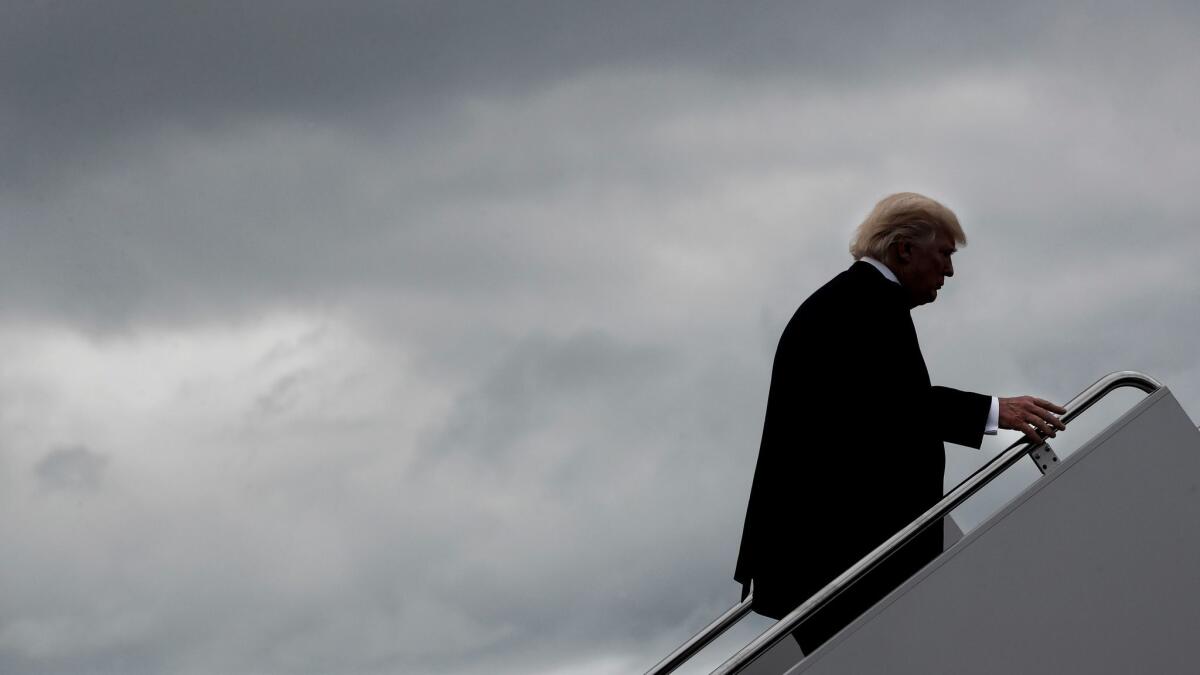No, Trump’s support hasn’t collapsed, but yes, he’s increasingly alone

In the annals of the modern presidency, few chief executives have been as alone as President Trump appears now — shunned by major business leaders, at odds with his party’s congressional leadership and deeply estranged from more than half the nation.
Polls taken in the past week, since Trump made comments that seemed to make excuses for neo-Nazi demonstrators in Charlottesville, Va., have shown the negative reaction.
But they’ve demonstrated something else as well: Like other embattled presidents, including even Richard Nixon at the height of Watergate, Trump continues to hold the support of a hard core of determined backers.
They are not as numerous as the group that voted for Trump in November; their ranks have eroded steadily since he took office.
Trump’s support, however, remains big enough to threaten Republican elected officials who might be tempted to openly break with the president. Potentially, it could also serve as a political base from which he could bounce back.
The latest evidence comes from three surveys done for NBC News that were released Sunday by the polling unit at Marist College in Poughkeepsie, N.Y. The surveys polled residents of the three states that put Trump over the top last year: Pennsylvania, Michigan and Wisconsin.
Several numbers in those surveys indicate trouble for Trump, but the most telling may be this: Among people who voted for him last year, 23% in Wisconsin, 19% in Pennsylvania and 16% in Michigan now do not approve of his performance in office, the polls found.
Roughly one in five Trump voters in each of the three states chose “embarrassed” when asked how his conduct in office makes them feel.
Those defections dwarf the size of Trump’s margin over Hillary Clinton in those three states, which ranged from eight-tenths of a point in Pennsylvania down to two-tenths of a point in Michigan.
“Residents are clearly dissatisfied in how candidate Trump transitioned into President Trump,” Lee Miringoff, the director of the poll, wrote in describing his results.
None of that means Trump would definitely lose those states if he runs for reelection in 2020. The election is much too far away to predict and it’s possible that voters who say they disapprove of a president’s performance might cast ballots for him, regardless, if they dislike the opposing candidate.
The current polls can tell us more, however, about next year’s midterm elections. The party in the White House almost always loses seats in a president’s first midterm election. The issue for 2018 will be how many: Democrats, who currently hold 194 seats in the House, would need to pick up 24 for a majority.
Political scientists have found that two polling measures typically have provided good guidance on how midterm elections will go. One is a president’s job approval. The other is a question asking voters which party they’d like to see win — a so-called generic ballot.
On both scores, Republicans currently sit in very risky territory.
The share of Americans who approve of Trump’s job performance started low and has dropped slowly but fairly steadily throughout his presidency, with the biggest drops coming each time the debate over healthcare legislation has dominated the news.
His approval fell below 40% in polling averages last month, during the Senate debate on repealing the Affordable Care Act. It has fluctuated slightly from survey to survey since then, but on average has not climbed back above four in 10. The share who disapprove has remained in the mid-50s, with a small percentage undecided.
At 40% approval, Trump would be a drag on his party’s efforts to hold onto its House majority. If his approval consistently drops below that level into the mid-30s, the drag would likely be fatal to GOP hopes.
On the generic ballot, Republicans already have a sizable disadvantage. The amount varies from survey to survey, but the latest YouGov poll was fairly typical: It found Democrats holding an eight-point lead, 41%-33%
Because Democratic candidates rely on younger and less affluent voters, who don’t show up to vote as reliably as Republicans do, they will need an advantage of that scale or larger on the generic ballot to be confident of taking a House majority.
The ups and downs in Trump’s standing at this point are driven mostly by Republicans and Republican-leaning independents — Democrats are almost unanimous in their rejection of him.
The GOP defections have been larger than recent presidents have usually had from within their own parties.
A CBS poll released on Thursday, for example, showed that about one in five Republicans disapproved of how Trump had responded to the violence in Charlottesville. The YouGov survey had a similar result.
Similarly, SurveyMonkey’s weekly polling on Trump’s support found that after the contentious news conference on Tuesday in which he assigned blame to both sides for the violence in Charlottesville, his support dropped by a small, but noticeable amount, with the decline coming among Republicans and independents.
In these highly polarized political times, presidents normally can count on close to 90% support from within their own party’s ranks. On Charlottesville, Trump was getting just 67% approval among Republicans, the CBS poll found.
President Obama’s support among Democrats seldom dropped below 90%. President George W. Bush maintained similar levels of support among Republicans up until the final chapter of his presidency, when the reaction to the war in Iraq, his administration’s response to Hurricane Katrina and the weakening economy all drove down his support.
Trump’s backers, of course, like to scoff at polls, repeatedly declaring that since surveys failed to predict his electionin November, they should be ignored now. Most nationwide polls in 2016, however, had final results within a couple of points of the actual results. Even on the state level, where some polls had larger errors, most were close.
For more on Politics and Policy, follow me @DavidLauter
Get the latest news from the nation’s capital on Essential Washington »
ALSO
In January, President Trump vowed to hire 5,000 new Border Patrol agents. It never happened
U.S. lays out ambitious schedule for NAFTA talks as opening round concludes
L.A. Times Editorial: Enough is enough. Trump is a danger to the Constitution
More to Read
Get the L.A. Times Politics newsletter
Deeply reported insights into legislation, politics and policy from Sacramento, Washington and beyond. In your inbox three times per week.
You may occasionally receive promotional content from the Los Angeles Times.







